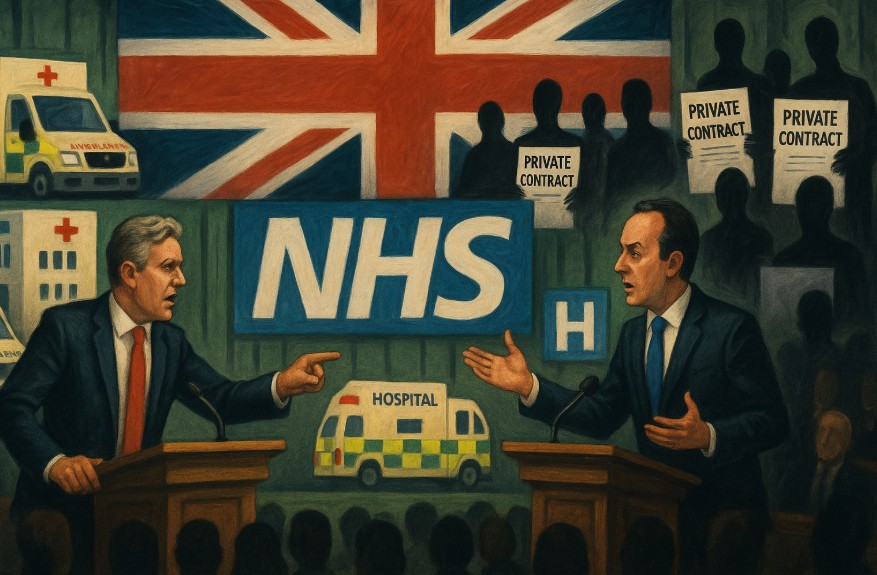The National Health Service (NHS) remains a cornerstone of British life, representing free and universal healthcare for all UK citizens. As political discourse intensifies ahead of the next general election, one party has come under increased scrutiny: Reform UK. Led by Nigel Farage, Reform UK’s policies, particularly around healthcare, have stirred debates and raised concerns. This article investigates whether Reform UK truly wants to privatise the NHS or if their agenda is being misunderstood.
What Is The Reform Party And What Do They Stand For?
Reform UK is a relatively new political party that emerged from the Brexit Party in 2020. It positions itself as a voice for those dissatisfied with the political mainstream, advocating for reduced government spending, lower taxes, and radical changes in public services.
While the party gained initial support from those who wanted the UK to leave the European Union, its current platform now extends into wider issues, particularly public sector reform.
Healthcare is a major focus, with Reform UK claiming that the NHS is inefficient and bloated by bureaucracy. Their approach is built on reducing management overheads, increasing competition, and involving the private sector where appropriate.
These proposals have sparked discussions about whether they signal an intention to privatise the NHS, even if the party does not use that exact language.
What Has Reform Said About The NHS In Their Official Policies?

Reform UK has not produced a detailed health policy document comparable to other major parties, but they have made several key public statements outlining their priorities. Their 2024 general strategy includes:
- Opening NHS services to competition to improve performance
- Cutting administrative roles and redirecting resources to front-line staff
- Working with private providers to increase capacity and reduce waiting times
These policy points aim to address what they view as systemic inefficiencies. Reform argues that the NHS should maintain universal access but operate with greater flexibility, including by partnering with external organisations.
This has led to concern among political commentators and healthcare unions that the changes may lead to a reduction in direct public control of healthcare services.
Is Reform Proposing NHS Privatisation Or Restructuring?
Reform UK’s language consistently avoids the term “privatisation”, preferring phrases like “efficiency”, “partnerships”, or “outsourcing”. However, their proposals imply a significant shift in how healthcare services could be delivered. The introduction of market mechanisms and private providers often aligns with early stages of a privatisation process, even if full transfer of ownership does not occur.
Critics argue that these types of structural reforms result in two-tier systems, where those who can afford private services gain better access and faster care, while the rest depend on a system with potentially declining resources.
The table below outlines key differences between restructuring and privatisation to clarify the implications of Reform’s approach:
| Feature | Restructuring | Privatisation |
| Ownership | Remains public | Transfers to private sector |
| Funding | Public funding | Mixed or private funding |
| Service Delivery | Possible private partnerships | Mostly delivered by private companies |
| Access | Universal access preserved | May vary depending on private coverage |
| Accountability | Public sector governance | Corporate governance |
Reform’s proposals suggest a model where restructuring leads to increased private involvement, which some experts believe could gradually lead to full privatisation over time.
What Has Nigel Farage Said About Paying For NHS Services?

Nigel Farage has been at the centre of controversy regarding the future of the NHS. In a 2012 speech, Farage suggested that people should consider paying for services through insurance for non-urgent healthcare. While this statement was made prior to the formation of Reform UK, it continues to follow him in political discourse.
In more recent interviews, Farage has stated that he supports the NHS being free at the point of use for all core services. However, he has also expressed support for a “hybrid model” in which private companies can play a greater role in delivering non-emergency services.
This dual messaging has created confusion and concern. While he avoids suggesting patients should directly pay for NHS services, his praise of private healthcare models in countries like Switzerland and the Netherlands indicates a potential openness to more systemic changes that reduce the NHS’s role.
How Does Reform’s NHS Stance Compare To Other UK Parties?
To understand the uniqueness of Reform UK’s healthcare proposals, it’s helpful to compare them with the positions of other major UK political parties. The table below provides a side-by-side summary of NHS-related policy stances.
| Political Party | NHS Policy Focus |
| Reform UK | Reduce bureaucracy, involve private providers, increase efficiency |
| Labour Party | Maintain full public ownership, increase NHS funding, expand staff |
| Conservative Party | Invest in NHS but continue existing public-private partnerships |
| Liberal Democrats | Improve mental health services, reduce waiting times, oppose NHS privatisation |
Reform UK stands out for its emphasis on shrinking public sector control and bringing in market competition. Unlike Labour or the Liberal Democrats, who advocate for a completely public NHS, Reform favours partial private involvement.
What Are The Implications Of A Privatised NHS System?

The concept of a privatised NHS sparks strong reactions across the UK, largely because the NHS has long stood as a symbol of social equity and national pride. Any steps towards privatisation, even partial, raise concerns about the erosion of universal healthcare principles. Understanding the full implications requires examining how privatisation could affect access, quality, cost, and the long-term sustainability of the UK healthcare system.
A privatised system, whether full or partial, alters how services are delivered, who provides them, and how they are funded. Even without selling NHS assets outright, introducing private providers to handle core services can fundamentally change the relationship between the patient and the healthcare system.
1. Impact on Healthcare Access
A fully public NHS offers healthcare free at the point of use, regardless of a patient’s income or background. Introducing private sector providers into this system could lead to service fragmentation, where patients may receive different levels of care depending on where and how they access services.
Private providers often focus on profitability and efficiency. As a result, they may be less likely to operate in less profitable areas, such as rural communities or regions with higher health risks, potentially creating geographic disparities in service availability.
Patients who can afford to “top-up” with private insurance or direct payments may gain faster access to treatment, while others could face longer waiting times in the public system, effectively creating a two-tier model of care.
2. Cost Implications for the Public
Privatisation may not necessarily lead to cost savings for the taxpayer. While private firms might operate more efficiently in some contexts, they also seek profits, which public institutions do not. Administrative overheads, contract management costs, and profits can add to overall spending, not reduce it.
Studies from the United States and other systems with high levels of private involvement show that privatised healthcare often results in higher per capita spending without proportional gains in health outcomes. Furthermore, as seen in partially privatised sectors of UK public services (e.g., rail and energy), private involvement can lead to price increases and reduced accountability.
If the NHS were to adopt a more privatised model, patients might also face indirect costs:
- Prescription charges may rise if service providers operate outside of NHS price controls.
- Co-payments for certain treatments could become more common.
- Insurance products may be introduced for faster or specialist services.
3. Effects on Service Quality and Continuity
Another concern with privatisation is the fragmentation of care. When services are split among multiple providers, patients may experience:
- Disjointed care due to poor coordination between public and private entities
- Conflicting treatment protocols
- Variability in the quality of service depending on provider funding and standards
The NHS’s strength lies in its integrated model, where primary, secondary, and emergency care are closely coordinated. Introducing multiple private stakeholders could undermine this integration, affecting patient safety and treatment outcomes.
Moreover, some private providers may prioritise lower-risk or high-margin cases, leaving the more complex and costly treatments to the NHS. This “cherry-picking” can place additional strain on the public system, which must still cover the most resource-intensive patients.
4. Workforce Challenges and Resource Allocation
Privatising elements of the NHS could also disrupt the workforce. Nurses, doctors, and other healthcare professionals might be drawn to private firms offering better pay or working conditions. This could result in:
- Staffing shortages in NHS-run hospitals and clinics
- A divided workforce operating under different contracts and standards
- Reduced morale among healthcare workers committed to public service principles
In addition, resource allocation may shift from need-based funding to profit-driven contracts. This can skew investment towards more profitable procedures, like elective surgeries, while underfunding less profitable but essential services such as mental health care, geriatric support, and chronic illness management.
5. Long-Term Sustainability of the NHS Model
The NHS has historically been funded through general taxation, allowing it to deliver care based on need rather than ability to pay. Introducing private elements threatens to erode this model over time. As more services become privately delivered or funded, political support for general taxation to support a fully public system may decline.
A gradual shift to private sector involvement could lead to:
- Reduced government responsibility for healthcare outcomes
- Dependence on private investment to expand capacity or update technology
- Increased volatility in service delivery due to market competition
Once a significant portion of services is run by private companies, it becomes difficult to reverse the trend. Contracts are often long-term and expensive to cancel, creating structural dependence on private providers.
What Does Public Opinion Reveal About NHS Privatisation Fears?
Polling data consistently shows strong public opposition to NHS privatisation. In a 2023 YouGov poll, 78% of respondents opposed increased private sector involvement in NHS service delivery. Trust in the NHS as a public institution remains high, and any perceived threats to its status often provoke significant backlash.
This resistance may explain why no major party, including Reform UK, openly uses the term “privatisation” in its manifestos. Instead, proposals are framed in terms of necessary reform, even when they involve substantial changes to how care is delivered.
The public’s preference remains clear: any reform should enhance the NHS without compromising its public service ethos. Reform UK’s challenge lies in convincing voters that its approach aligns with this expectation, especially when many interpret its policies as a stepping stone toward greater private influence.
Could Reform’s Healthcare Agenda Affect NHS Funding And Access?

Implementing Reform UK’s health policy could lead to redistribution of NHS funding. Partnering with private companies would likely require public subsidies or contracts to support outsourced service delivery. This could mean fewer funds available for traditional NHS operations.
There are concerns that this redirection of resources may result in:
- Unequal service levels between regions
- A drop in staffing in NHS-operated facilities as personnel shift to private providers
- Increased complexity for patients navigating a mixed system
Experts from health think tanks such as the Nuffield Trust warn that over-reliance on private capacity may lead to a fragmented system that is more expensive and harder to coordinate. For patients, this could mean longer waits, more paperwork, and increased stress in managing care.
How Credible Is The Privatisation Claim Against Reform?
Allegations that Reform UK intends to privatise the NHS are based on interpretation rather than direct evidence. The party has not published any document explicitly calling for the sale or closure of NHS services. However, their policy suggestions open the door to market-based approaches that resemble steps taken during past privatisation efforts in other public sectors.
Fact-checking organisations like Full Fact confirm that while Reform has not advocated for full privatisation, their policy language suggests significant changes that could lead in that direction over time. Media reports and political opponents often amplify these concerns, which makes public understanding of the issue even more complex.
In short, while it is inaccurate to say that Reform UK has a declared plan to privatise the NHS, it is equally reasonable for the public and analysts to scrutinise their proposals closely, especially given the NHS’s importance to the UK’s social fabric.
Conclusion
Reform UK has not openly declared an intention to privatise the NHS. However, their policy language and strategic direction suggest a shift towards increased private sector involvement. Whether labelled as “reform,” “modernisation,” or “efficiency,” these steps resemble early stages of privatisation seen in other public systems.
While it is inaccurate to claim they have a formal plan to privatise the NHS, it is equally misleading to dismiss the possibility outright. Voters should scrutinise the fine print and consider the long-term effects of proposed healthcare policies before drawing conclusions.
Frequently Asked Questions
What does “privatisation” of the NHS actually mean?
Privatisation typically refers to transferring services from public ownership to private providers. In the NHS context, this could mean outsourcing treatment, administration, or infrastructure.
Has the NHS already been partially privatised?
Yes, certain non-emergency services and auxiliary operations have been outsourced to private companies for years. This includes cleaning, catering, and elective surgeries.
Are NHS reforms always a step toward privatisation?
Not necessarily. Reforms can aim at improving efficiency without involving private providers. However, many fear that reforms are often used to justify outsourcing.
Is there any evidence that privatisation improves healthcare outcomes?
Evidence is mixed. Some studies suggest that private providers can reduce wait times, while others highlight inconsistent care quality and increased costs to the public.
Why do some political parties support private partnerships in healthcare?
Parties argue that the private sector can bring innovation and alleviate NHS pressures. However, this approach is controversial and often unpopular with voters.
Do healthcare professionals support Reform UK’s policies?
Many doctors’ and nurses’ unions have expressed concern over any proposals involving privatisation, emphasising the need for public investment instead.
Can the NHS be both efficient and fully public?
Yes. Experts argue that by reducing bureaucracy, investing in technology, and improving workforce conditions, the NHS can be efficient without needing to privatise.








